Have you ever been out for a night on the town, or even just in your own living room, had a drink or several and wondered just how many sheet to the wind you actually are? Breathalyzers have been around for many years, but have mainly been used by law enforcement and related professions more so than the average citizen. But the Alcomate Revo, AK GlobalTech’s newest flagship product, is a state-of-the-art, handheld, lightweight breathalyzer for professional or personal use that does not require calibration. Let’s check it out. Gadget on!
Background
I drink a few alcoholic beverages here and there, on the weekends mostly. (And for the record, yes, I am well over 21 years of age.) I typically stick to beer (I’m really into IPAs lately, but my favorites are still stouts and porters, particularly my beloved Guinness), and occasionally wine. I’m very careful not to have more than one or two drinks, depending on how strong the drink is, when I’m out for dinner or at an away-from-home event. It’s just too risky from both a legal and—even more importantly—safety standpoint with the harm that can result from drunk driving. But I’ve often been curious about just how high my alcohol level is when I’ve been drinking various types and strengths of beverages. I’d always thought that breathalyzers were only available to those in the law enforcement and related professions, so when I was presented with the opportunity to review the Alcomate Revo Digital Personal Breathalyzer, I thought it would be very interesting to try one out.
Specs
Per the Alcomate site, the technical specs of the Alcomate Revo are as follows:
- Model: Alcomate Revo (Model TS200)
- Size/Dimensions: 4.0 x 2.0 x 0.6 inches
- Weight: 1.0 oz
- External Case Material: Molded ABS plastic
- Display: 4-digit LCD
- Alcohol Sensor: Fuel-Cell with PRISM Technology
- Re-calibration: Not required. Sensor Module should be replaced every 1000 test or at least once yearly.
- Detection Range: 0.000 – 0.400% BAC (g/dL)
- Warranty: 1 year (with 30-day money back guarantee)
Features
Per the Alcomate site, the main features of the Alcomate Revo are as follows:
- PRISM Technology
- DOT Approved
- US Coast Guard Approved
- Accuracy: +/- 0.005 at 0.10 g/dL (%BAC)
- Fuel-Cell Sensor
- 4-Digit LCD Results Display
- Active Pressure Sensor
- Deep Lung Air Sampling
- Cumulative Test Counter
Packaging
The Alcomate Revo’s packaging is a standard cardboard box with photos of the item inside on the front and back, as well as listing the features.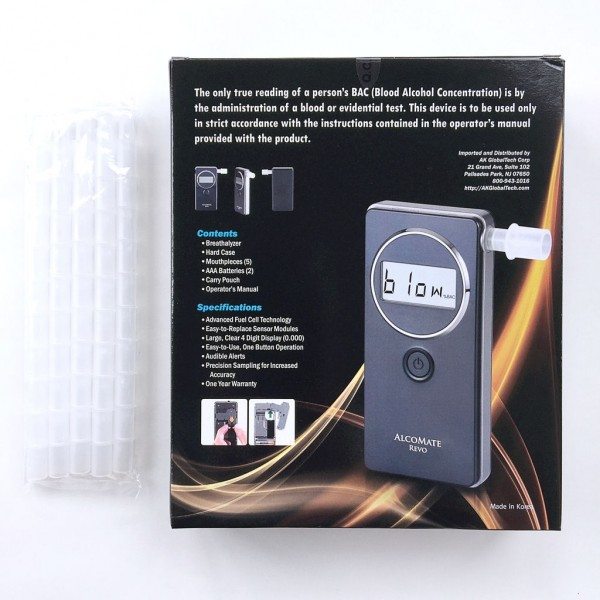
The Alcomate folks included a bag of extra mouthpieces, shown in the image above at left. More on the mouthpieces below.
Contents
The full list of contents of the Alcomate Revo Breathalyzer are show in the above photo and listed below:
- Revo Breathalyzer
- Pre-installed PRISM Component (Sensor Module)
- 5 x Mouthpieces
- 2 x AAA Batteries
- Carry Pouch
- Retail Case
- User’s Manual
- PRISM Component Instruction Decal
The Alcomate Revo includes a very durable ABS plastic, clamshell-type carrying case with a handle and snap latches. It is padded and has spaces for all the items that the Revo includes–although some of the compartments are a bit oddly-shaped for the items that are supposed to fit into them.
Features & Functions
The Alcomate Revo is small and lightweight. It has a glossy dark (looks black most of the time, but in just the right light you can see its true color is a deep blue) ABS plastic outer shell (a bad surface for showing fingerprints), a rectangular 4-digit LCD display ringed by a circular chrome bezel, and a single button with its own chrome bezel. That’s it. Very simple layout. I like simple.
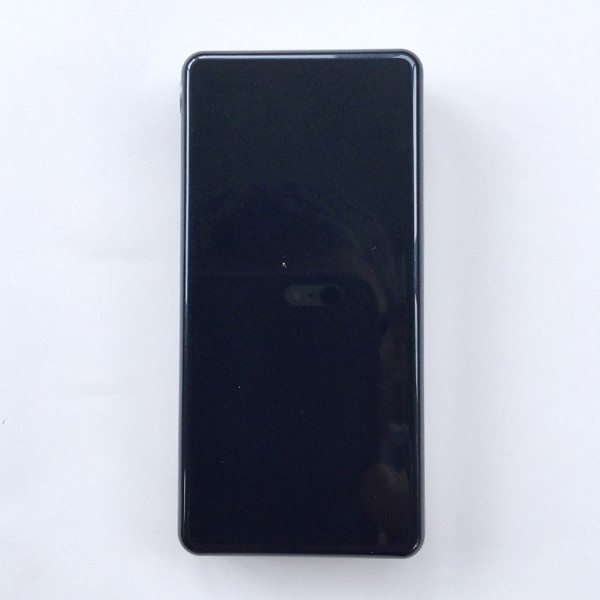
The rear of the Alcomate Revo is quite plain. Except for my fingerprints, of course.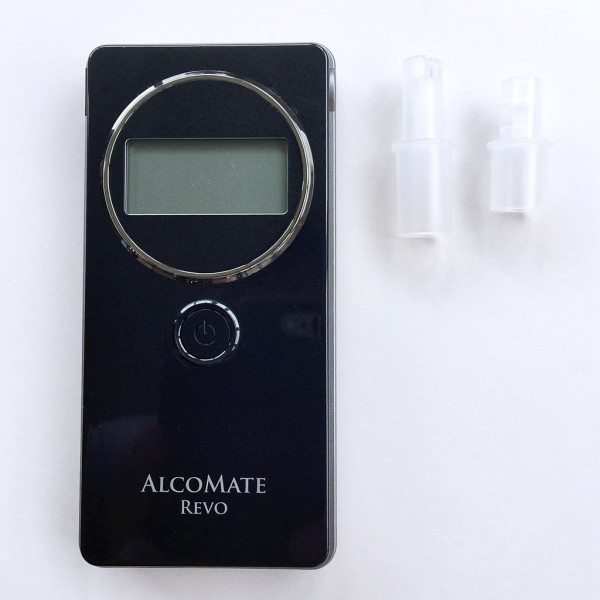
The other component necessary for the operation of the Alcomate Revo is a mouthpiece, which are disposable plastic tubes that fit into a port on the side of the device. When blowing into the Alcomate Revo during operation, the user places his or her mouth on the mouthpiece rather than on the Revo itself. This of course helps cut down on both germs and cooties. Additional mouthpieces are available from Alcomate in various quantities.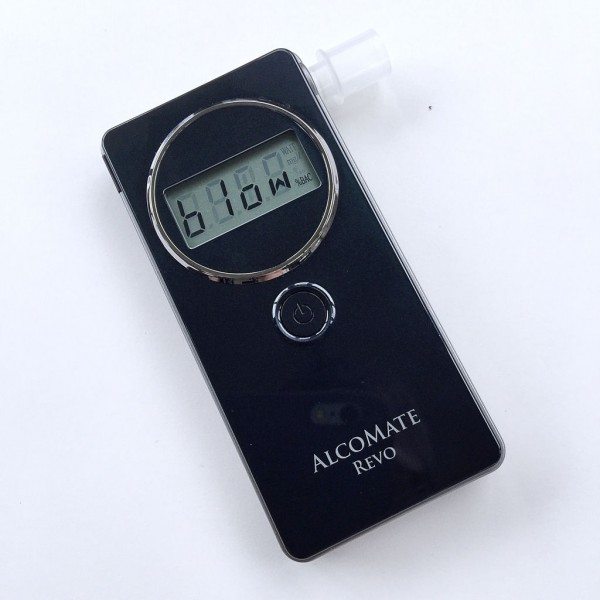
Operation of the Alcomate Revo is as simple as its design. Press and hold the button for a second and it wakes up and starts its calibration cycle, which lasts for a few seconds. Once the display reads “blow,” it’s time to, well…blow.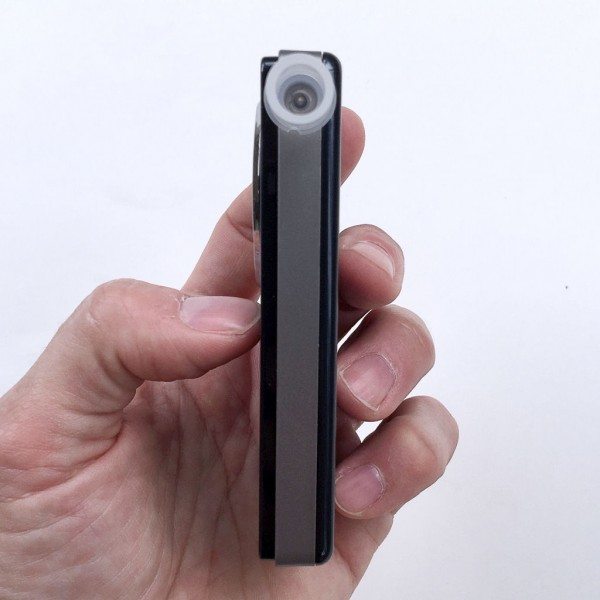
Go ahead. Blow into the mouthpiece until you hear an audible “click.” Then the Revo does its thing, analyzing the sample of your breath and displaying a value, your %BAC, or Blood Alcohol Content. The display shuts itself off after 15 seconds to conserve battery power. One item to note is that Revo’s Operator’s Manual strongly cautions that the user must wait 20 minutes after eating anything before using the Revo, or it could give inaccurate results or even damage the device. Yikes. Many people, myself included, drink alcoholic beverages while eating a meal, so if the conditions have to be this precise or else damage the device, this seems almost impractically restrictive.
The “guts” (perhaps “brains” is more appropriate here) of the Revo are based around a combination of its Pre-calibrated Replaceable Intelligent Sensor Module (or PRISM) technology and state-of-the-art electrochemical fuel-cell breath alcohol sensing. Most breathalyzers must be sent back to the manufacturer for re-calibration, which means additional cost, downtime and deteriorating accuracy over time. However, the Revo’s unique, patented PRISM technology can be replaced quickly and easily. The Alcomate Revo includes one replacement PRISM module (additional replacement PRISM modules for the Revo can be purchased from the Alcomate site for $89.95) and replacing it is quite simple. The Alcomate Revo is intended to be a step up from cheaper breathalyzers, such as those that attach to smartphones, because of this technology. Additionally, it is worth mentioning that Alcomate breathalyzers are Department of Transportation approved for law enforcement applications, cleared for use by the United States Coast Guard and the Alcomate Revo, along with its sister product, the Alcomate Premium, were the only breathalyzers selected in 2013 by the United States Navy and later the United States Marine Corps to administer its comprehensive alcohol screening program covering all personnel on Navy marine vessels, Navy facilities and Naval bases worldwide. Some pretty solid credentials.
The Alcomate Revo’s back panel can be removed by inserting the tip of a small flathead screwdiver into a slot on the bottom, slightly prying it open, and carefully popping the back off. The spent PRISM module is then easily removed and its replacement can be snapped in place. Alcomate advises replacing the PRISM module every 1000 uses (which is easy to determine thanks to the counter that is displayed briefly after each use) or yearly at minimum. Note that this procedure is also used when replacing the two AAA batteries that power the Revo.
The Revo comes with a soft-sided zipper case that feels like it is made from neoprene or similar material. It provides a bit of bump and splash protection, but not much more. The soft case also has a small carabiner attached, in case you need to take the Revo mountain climbing or rappelling (or maybe just want to attach it to your purse or backpack).
Performance
How well did the Revo work? Well, that’s somewhat difficult for me to report on definitively. I have no effective way to evaluate and quantify its accuracy, but I did try a few things. First, I did a simple test which consisted of using the Revo to measure my BAC while I drank various alcoholic beverages. I can confirm that the Revo did register 0% BAC when I had consumed none of the beverage, and it registered increasingly higher BAC percentages as I continued to drink it. However, the Revo’s measured BAC percentages seemed to vary quite a bit—at times, the BAC shown seemed way too low for the amount of beverage I had consumed; at other times, it seemed very high. Perhaps this observed variation was due to me never having access to a breathalyzer and not really having a good feel for just how high by BAC actually is. Or perhaps the type of alcohol and the rate of consumption both factor even higher into the BAC than I thought. Next I tried an online BAC calculator site that included several factors in its calculation and so seemed as though it might be fairly accurate. I used this site alongside the Revo while I again drank a few beers. The Revo did seems to correlate somewhat closely with the calculator site, but there was often a discrepancy of 20% or more. What does all this mean? Perhaps the Revo does have a wider variation in its measurement range than I expected. In any case, I have no way to validate the Revo’s BAC measurement without access to a breathalyzer with a known, calibrated accuracy.
Conclusion
In terms of ergonomics, the Alcomate Revo is a fantastic device. It is small, about the size of a deck of playing cards, and very lightweight. Its interface is very simple—basically just an LCD display and a single button—and its operation is simple as well. Replacing its PRISM cartridge and its batteries is very straightforward also. However, I questioned the Revo’s accuracy because it did seem to vary quite a bit when I tried it out; however, I have no way of confirming if the Revo is actually inaccurate, or if the variability that I saw was simply a result of other factors. Overall, I have mixed feelings about the Revo: its physical package and operation are extremely well designed, but its accuracy and consistency seemed suspect without any effective way to confirm it.
Updates 04/11/16
I continued to play around with this for a while, but I also continued to question its accuracy.
Source: The product sample for this review was provided by Alcomate. For more information, please visit their site at www.alcomate.net.
Gerber Gear EVO Jr. Folding Knife - Serrated Edge [22-41493]
22% OffGerber Gear 22-47162N Fast Draw Folding Assisted Opening Pocket Knife, Fine Edge, Black
$41.14 (as of January 29, 2026 17:24 GMT -06:00 - More infoProduct prices and availability are accurate as of the date/time indicated and are subject to change. Any price and availability information displayed on [relevant Amazon Site(s), as applicable] at the time of purchase will apply to the purchase of this product.)Product Information
| Price: | $249.95 |
| Manufacturer: | AK GlobalTech |
| Requirements: |
|
| Pros: |
|
| Cons: |
|

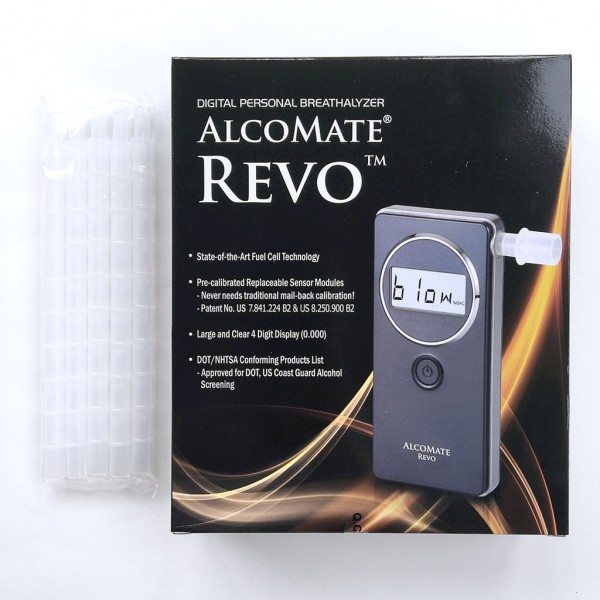
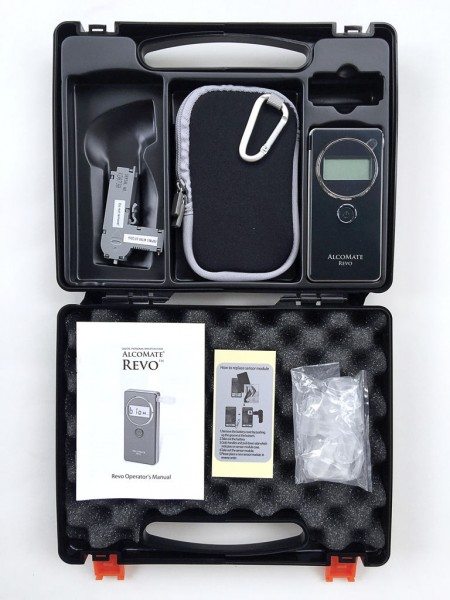
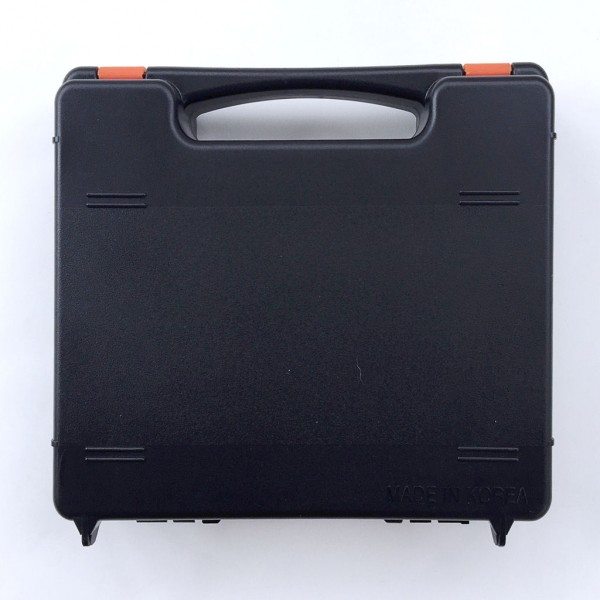
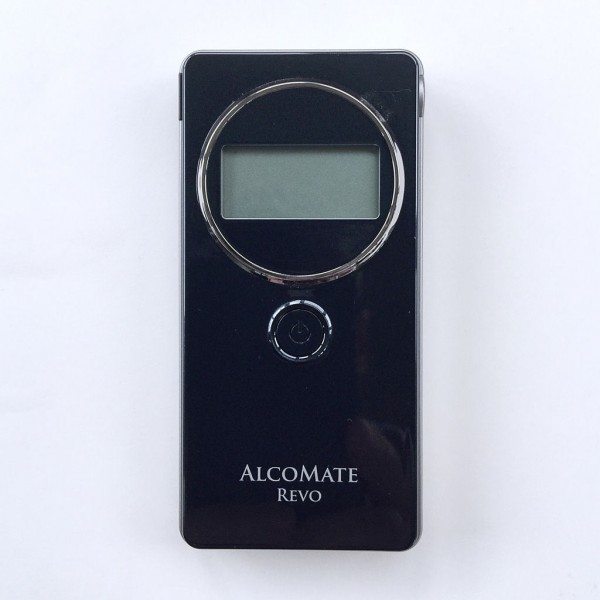
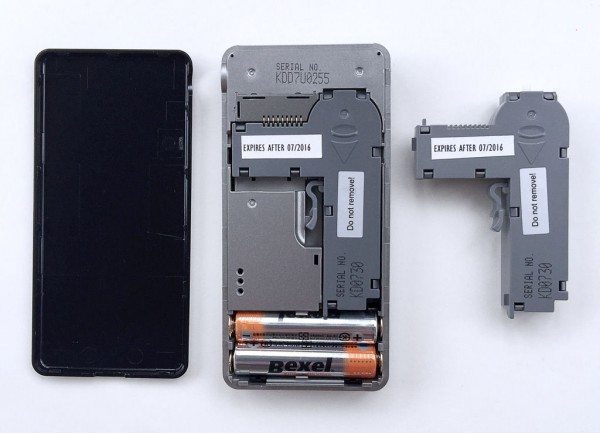
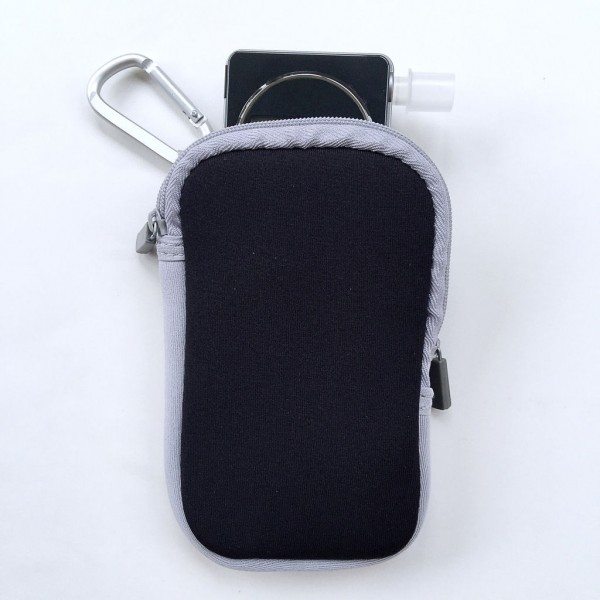


Gadgeteer Comment Policy - Please read before commenting
I have 21 years of law enforcement experience, and have been a trained and certified Breathalyzer and Intoxilyzer operator for the entire duration. In my state we also use an Alco-Sensor, which is similar to this device.
With that said, being careful is always a good thing. The product may or may not be accurate and useful depending upon its build quality and inherent accuracy, which you seemed to have some question about yourself in real-life usage. An intoxicated person using this for its intended purpose would of course have the make determinations based on the reading, which if questioned, could lead to some serious consequences.
The other very important factor in the correct usage of these type of devices, in real-world application, is the operator being properly trained and sober. Neither of these are guaranteed when using this at home.
Any device that cautions someone to possibly not drink and drive is a good thing. Of course, the concern is that it may provide a lower reading than is accurate, and consequently someone may make the decision to drive. Further, devices such as this are always good to use as a tool, but should never take the place of good decision making, which of course is the first thing to diminish when consuming alcoholic beverages.
Great review, and nothing against the product, but for more or less a personal system (which never has to be calibrated? Come on.), I’d save my money and just never take the chance driving. Plus, $250 will buy a lot of great Craft Beer, which you can enjoy responsibly!
Thanks for this response, John. I agree with essentially everything you said.
If you are going to drive, don’t drink. These testers are designed to push you to as close as you can get which in my opinion is too much. If you need to use one of these things it means you are already a danger. I feel strongly about this as my childhood friend was crushed to death by a car that flipped due to loss of control caused by alcohol.
Agree, yeppers.
The author writes, “.. it is worth mentioning that Alcomate breathalyzers are Department of Transportation approved for law enforcement applications.” This is misleading because the DOT has two lists of approved products, one for alcohol screening and one for evidential grade accuracy. The Alcomate is approved for alcohol screening which means it can detect the presence of alcohol on the breath above the .02 BAC level and not much more. The approval that the Alcomate has received says nothing about the accuracy of the reading which is what law enforcement cares about. Normally law enforcement chooses their devices from the “Evidential Breath Tester” approved list. These products are much more rigorously tested for accuracy. In short DON’T EXPECT POLICE GRADE ACCURAY FROM CONSUMER DEVICES.
Well said.
At our clinic we have a similar unit called the alcomate premium and it worked really well for our needs. We haven’t needed to move up to a fuel cell model since we’re testing for zero tolerance.
It’s interesting to be able to change out a fuel cell model, but sensor prices are much higher than the version we have. $90 versus $30.
this is the model we have.
http://www.safety-devices.com/alcomate-premium-al7000-breathalyzer-p-35.html
Not everyone who uses or purchases one wants to drink to a supposed legal limit. In most states you can be arrested under 0.08 with other evidence. What’s wrong with knowing how you feel at 0.03 or 0.05 or that you need to wait an hour or two before driving?
I agree, Mike, and that’s a great point as well. Thanks for commenting.
Great to read and review..Breathalysers are for guide only, whenever i know i have a drinking session with my buddies, i just bring it to guide me esp when i have to drive in going home. i have alcosense verity and works well.